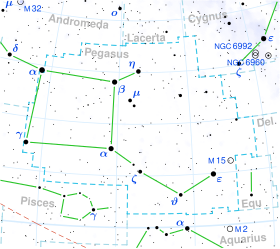35 Pegasi
| Observation data Epoch J2000 Equinox J2000 | |
|---|---|
| Constellation | Pegasus |
| Right ascension | 22h 27m 51.52233s[1] |
| Declination | 4° 41′ 44.3916″[1] |
| Apparent magnitude (V) | 4.80[2] |
| Characteristics | |
| Evolutionary stage | horizontal branch |
| Spectral type | K0III[3] |
| U−B color index | +0.88[2] |
| B−V color index | +1.06[2] |
| Astrometry | |
| Radial velocity (Rv) | +54.16[4] km/s |
| Proper motion (μ) | RA: +77.57[5] mas/yr Dec.: −306.12[5] mas/yr |
| Parallax (π) | 21.0039 ± 0.2419 mas[1] |
| Distance | 155 ± 2 ly (47.6 ± 0.5 pc) |
| Absolute magnitude (MV) | 1.50[6] |
| Details | |
| Mass | 1.18[6] M☉ |
| Radius | 8.5[7] R☉ |
| Luminosity | 31.69[8] L☉ |
| Surface gravity (log g) | 2.76[9] cgs |
| Temperature | 4,676[9] K |
| Metallicity [Fe/H] | −0.28[9] dex |
| Rotational velocity (v sin i) | 1.5[10] km/s |
| Age | 4.94[11] Gyr |
| Other designations | |
| Database references | |
| SIMBAD | data |
35 Pegasi is a single[13] star in the northern constellation of Pegasus. It is visible to the naked eye as a faint, orange-hued point of light with an apparent visual magnitude of 4.80.[2] The star is located approximately 155 light years away from the Sun based on parallax,[5] and is drifting further away with a radial velocity of +54 km/s.[4] The star has a relatively high proper motion, traversing the celestial sphere at the rate of 0.318 arc seconds per annum.[14]
This is an aging giant star[15] with a stellar classification of K0III,[3] having exhausted the hydrogen at its core and expanded to 8.5[7] times the Sun's radius. It is a red clump giant, indicating it is on the horizontal branch and is generating energy through helium fusion at its core.[15] The star is five[11] billion years old with 1.2[6] times the mass of the Sun. It is radiating 32[8] times the Sun's luminosity from its enlarged photosphere at an effective temperature of 4,676 K.[9]
There are two distant visual companions: component B, at an angular separation of 80.5″ and magnitude 10.0, and C, at separation 176.3″ and magnitude 10.64.[16]
References
- ^ a b c Brown, A. G. A.; et al. (Gaia collaboration) (August 2018). "Gaia Data Release 2: Summary of the contents and survey properties". Astronomy & Astrophysics. 616. A1. arXiv:1804.09365. Bibcode:2018A&A...616A...1G. doi:10.1051/0004-6361/201833051. Gaia DR2 record for this source at VizieR.
- ^ a b c d Ducati, J. R. (2002). "VizieR Online Data Catalog: Catalogue of Stellar Photometry in Johnson's 11-color system". CDS/ADC Collection of Electronic Catalogues. 2237. Bibcode:2002yCat.2237....0D.
- ^ a b Frasca, A.; et al. (December 2009). "REM near-IR and optical photometric monitoring of pre-main sequence stars in Orion. Rotation periods and starspot parameters". Astronomy and Astrophysics. 508 (3): 1313–1330. arXiv:0911.0760. Bibcode:2009A&A...508.1313F. doi:10.1051/0004-6361/200913327. S2CID 118361131.
- ^ a b Famaey, B.; et al. (2005). "Local kinematics of K and M giants from CORAVEL/Hipparcos/Tycho-2 data". Astronomy & Astrophysics. 430: 165–186. arXiv:astro-ph/0409579. Bibcode:2005A&A...430..165F. doi:10.1051/0004-6361:20041272. S2CID 17804304.
- ^ a b c Van Leeuwen, F. (2007). "Validation of the new Hipparcos reduction". Astronomy and Astrophysics. 474 (2): 653–664. arXiv:0708.1752. Bibcode:2007A&A...474..653V. doi:10.1051/0004-6361:20078357. S2CID 18759600. Vizier catalog entry
- ^ a b c Da Silva, Ronaldo; et al. (2015). "Homogeneous abundance analysis of FGK dwarf, subgiant, and giant stars with and without giant planets". Astronomy & Astrophysics. 580: A24. arXiv:1505.01726. Bibcode:2015A&A...580A..24D. doi:10.1051/0004-6361/201525770. S2CID 119216425. Vizier catalog entry
- ^ a b Allende Prieto, C.; Lambert, D. L. (1999). "Fundamental parameters of nearby stars from the comparison with evolutionary calculations: Masses, radii and effective temperatures". Astronomy and Astrophysics. 352: 555–562. arXiv:astro-ph/9911002. Bibcode:1999A&A...352..555A. Vizier catalog entry
- ^ a b Anderson, E.; Francis, Ch. (2012). "XHIP: An extended hipparcos compilation". Astronomy Letters. 38 (5): 331. arXiv:1108.4971. Bibcode:2012AstL...38..331A. doi:10.1134/S1063773712050015. S2CID 119257644. Vizier catalog entry
- ^ a b c d Wu, Yue; et al. (2010). "Coudé-feed stellar spectral library – atmospheric parameters". Astronomy & Astrophysics. 525: A71. arXiv:1009.1491. Bibcode:2011A&A...525A..71W. doi:10.1051/0004-6361/201015014. S2CID 53480665.
- ^ Massarotti, Alessandro; et al. (January 2008). "Rotational and Radial Velocities for a Sample of 761 HIPPARCOS Giants and the Role of Binarity". The Astronomical Journal. 135 (1): 209–231. Bibcode:2008AJ....135..209M. doi:10.1088/0004-6256/135/1/209.
- ^ a b Luck, R. Earle (2015). "Abundances in the Local Region. I. G and K Giants". Astronomical Journal. 150 (3). 88. arXiv:1507.01466. Bibcode:2015AJ....150...88L. doi:10.1088/0004-6256/150/3/88. S2CID 118505114.
- ^ "35 Peg". SIMBAD. Centre de données astronomiques de Strasbourg. Retrieved 2019-07-01.
- ^ Eggleton, P. P.; Tokovinin, A. A. (2008). "A catalogue of multiplicity among bright stellar systems". Monthly Notices of the Royal Astronomical Society. 389 (2): 869. arXiv:0806.2878. Bibcode:2008MNRAS.389..869E. doi:10.1111/j.1365-2966.2008.13596.x. S2CID 14878976.
- ^ Lépine, Sébastien; Shara, Michael M. (March 2005). "A Catalog of Northern Stars with Annual Proper Motions Larger than 0.15" (LSPM-NORTH Catalog)". The Astronomical Journal. 129 (3): 1483–1522. arXiv:astro-ph/0412070. Bibcode:2005AJ....129.1483L. doi:10.1086/427854. S2CID 2603568.
- ^ a b Tautvaišienė, G.; et al. (December 2010). "C, N and O abundances in red clump stars of the Milky Way". Monthly Notices of the Royal Astronomical Society. 409 (3): 1213–1219. arXiv:1007.4064. Bibcode:2010MNRAS.409.1213T. doi:10.1111/j.1365-2966.2010.17381.x. S2CID 119182458.
- ^ Mason, Brian D.; et al. (2001). "The 2001 US Naval Observatory Double Star CD-ROM. I. The Washington Double Star Catalog". The Astronomical Journal. 122 (6): 3466. Bibcode:2001AJ....122.3466M. doi:10.1086/323920. Vizier catalog entry

